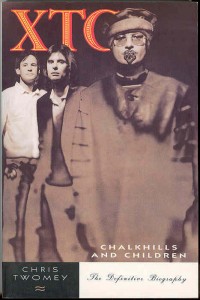
The Cover Of The Book. The Picture Comes From The "Nonsuch" Photo Shot.
Named after one of Andy’s most ethereal compositions, this book (first released in 1992) stands as a moving portrait of a band that is incredibly cerebral, and yet has the ability to tug at your heartstrings like few bands in history. That contradiction comes as no surprise. The story of XTC involves the clash between ideals and reality, and that is something that comes across very vividly on this book.
The book has 188 pages. It includes 10 chapters, two sections of black & white photographs and a discography at the end. It begins out of chronological order (the first chapter deals with Andy’s breakdown) and then the story properly starts and it is run without detours or digressions. It is also an “authorized” biography – the book was compiled from interviews with the band members and their families. And most key figures like Todd Rundgren and Steve Lillywhite are also among the interviewees.
Every chapter is named after a song. Only the one starting the book is accompanied by a quote (from Andy). I wish more quotes had been included, but that is a minor niggle.
I must also tell you that a revised edition was published in June, 2002. It has 256 pages and it goes beyond the “Nonsuch” album (the point where the first edition ended) to the years of legal disputes and Dave’s departure from XTC.
As a biography, “Chalkhills & Children” is a very balanced book: equal time is devoted to the different phases of the band, and the young lives of the main musicians are covered in good detail. Barry Andrews receives a little less space than his comrades, but that is only understandable and also fair if we bear in mind the number of albums he was involved in.
With XTC, there is just no middle ground. You either adore them or can’t stand the mere mention of the band’s name. If the latter is true I dare say you have not listened to the right records in their catalog and need to reconsider. It also doesn’t help that one of their most popular songs (Dear God) can cause too strong an opinion on first listens, either because of the subject matter or because Andy’s voice (which is an acquired taste) is particularly self-possessed there. Of course, not everybody has an obligation to adore a band. But I feel everybody has an obligation to give each band a comprehensive enough listen. And I know virtually no bands to deserve the time you could devote to XTC.
In the preceding paragraph I somehow gave away one of the main themes of this biography: XTC’s journey through the industry in search of recognition. No, “recognition” is not the right word. Far from it. Led by Andy, they have looked for a space. That space has changed over time, it has become wider, taller, smaller, but it never has become less enticing, and it never has failed to show those who follow the band that the “outside world” is indeed a flawed place. But a flawed place where dreams have their own weight, and that even as they become a true burden it is best to carry them around. Because they start disintegrating and their pieces fall to the ground. Others can pick these pieces of dreams, and to them they will not be a burden but something like gems. And that is what XTC stood for all this time. And I doubt any person who reads “Chalkhills and Children” will arrive at a different conclusion.

Pingback: G2 – Simplifying The Way Bands Are Booked | MusicKO